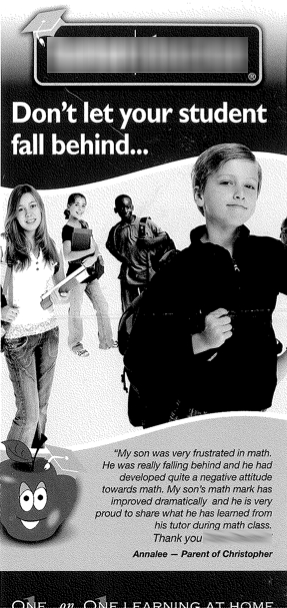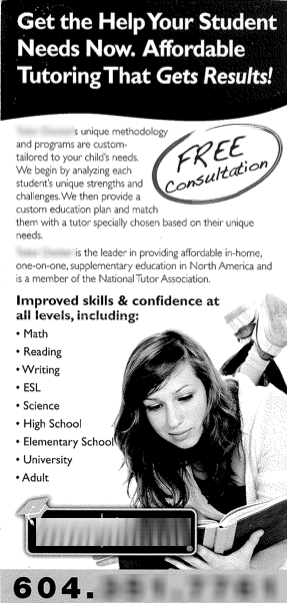I have not been making good use of any of the multimedia capabilities of a blog, so I thought I’d start scanning in some of the flyers for supplementary education from around the world that I’m collecting. If you have similar flyers, I would be delighted to add them to this series with some brief comments.
For now, I will blur out brand names/contact details, though I’m not entirely sure whether I will be able to keep that up in the long run. Note that I’m not including flyers for any of the juku where I’ve conducted research, in part to safeguard their anonymity.
So, what do I notice when I look st this flyer?
[Apologies for the black-and-white, will have to fiddle with the copy machine settings to make this colour for the future].
For the front side of the flyer (on the left), the quote by a satisfied parent is very common on this kind of advertising. Here it speaks to one of the two main claims by tutoring companies: better grades and better attitude. The quote acts at once as advertising the service’s main claims, but also providing evidence of their success, though obviously not in any replicable way.
Unusually for Vancouver, none of the students pictured are Asian-looking. This is contrary to what I found together with an intern some years ago when we surveyed Vancouver tutoring services.
I should note, BTW, that this flyer showed up on our doorstep in Kitsilano.
For the back side of the flyer, the paragraph here hits on all the main points that almost all supplementary education emphasizes: “unique methodology”, “custom-tailored”, “unique needs”. Presumably that is one of the main selling points, i.e. the ability (in contrast to conventional schools) to be able to tailor tutoring to a student’s learning goals. Whether this tailoring involves anything other than a different pace of progress is unclear, of course.
As is the case for many tutoring services in North America, the one advertised here is offering at-home tutoring, i.e. the equivalent of 家庭教師in Japan.
Something that his quite rare in juku promotional materials in Japan, but much more common for supplementary education in North America, is the claim of some kind of accreditation, in this case through membership in the “National Tutor Association“.
While this association does offer certification, all that’s advertised on the flyer is membership, and that is open to anyone, so it is essentially a useless piece of information that is most likely meant to hint at some kind of professional status.
Note that this particular tutoring service is a “home-based” franchise.



